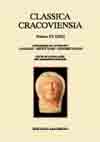Do the Kings Lie? Royal Authority and Historian’s Objectivity in Arrian’s Anabasis
Do the Kings Lie? Royal Authority and Historian’s Objectivity in Arrian’s Anabasis
Author(s): Bogdan BurligaSubject(s): History
Published by: KSIĘGARNIA AKADEMICKA Sp. z o.o.
Keywords: kingship; virtues; truthfulness; ideology; Hellenistic monarchy; historiography
Summary/Abstract: Taking departure from Arrian’s famous statement (Anab. 1, Praef. 2) that he mainly relied on Ptolemy Soter’s account of Alexander the Great’s history since Ptolemy was the king and lies should be avoided by him, the roots of the idea of the royal truthfulness are discussed. It is claimed that the Greek political thought about monarchy and the institution of kingship had a strong ethical flavor but the argument of the kings’ veracity was not especially stressed out. Arrian, however, has found it both in Alexander the Great’s ideology and the ideology of the royal court in Ptolemaic Egypt. Essentially, however, the origins of the truthfulness idea are to be sought in the royal Oriental (Achaemenid especially), official ethics, under the influence of which Alexander certainly remained. The novelty of Arrian the historian’s decision should by thus appreciated. It does not mean that Arrian’s account of Alexander’s expedition is ideally objective but it certainly means that in his effort to give a possibly unbiased history of the Macedonian king’s achievements, he tried to do his best.
Journal: Classica Cracoviensia
- Issue Year: 2012
- Issue No: 15
- Page Range: 5-58
- Page Count: 54
- Language: English

